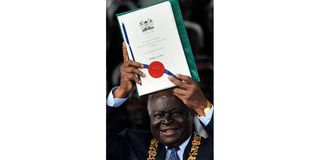How equality push gained momentum in Kibaki’s reign

Kenya's former president Mwai Kibaki, who died last week, with a copy of the 2010 Constitution. The law provided for the two-thirds gender rule.
What you need to know:
- The late President Mwai Kibaki’s government started a number of initiatives to enhance gender equality.
- Three women became ministers - Charity Ngilu, Martha Karua and Jebii Kilimo.
- In 2007, Mr Kibaki launched the Sh5 billion Women Enterprise Fund.
The push for gender equality gained momentum in the country during the late President Mwai Kibaki’s reign.
His government started a number of initiatives to enhance gender equality.
In his first term, three women were named ministers in the cabinet with Charity Ngilu becoming Health Minister.
Martha Wangari Karua who was then Gichugu MP, was appointed Minister of Water Resources while Linah Jebii Kilimo became Minister of State in the Office of the Vice President.
These appointments marked an improvement from his predecessor the late Daniel Arap Moi who only had one woman in his cabinet - Nyiva Mwendwa.
Several other women were named assistant ministers and permanent secretaries, including the late Wangari Maathai, a renowned international environmentalist and activist.

The former president who died last week, is also credited with coming up with initiatives to improve women’s welfare.
In 2007, Mr Kibaki launched the Sh5 billion Women Enterprise Fund (WEF).
The entity provides accessible and affordable credit to support women start and/or expand their businesses for wealth and employment creation.
Speaking during the launch of the fund in June 2007, Kibaki said the kitty was meant to increase women’s participation in business and to develop their capabilities to compete in the global market.
Mr Kibaki said his government was committed to encouraging women to participate fully in the development of the country and achieve his administration’s goals.
Since its inception, WEF has disbursed more than Sh10 billion to self-help groups, benefitting 1.2 million individual women across the country.
The fund offers a range of products and services to empower women and improve their income. One of its outstanding product is Tuinuke loan.
It is a loan facility at the constituency level or otherwise known as Constituency Women Enterprise Scheme (CWES), given out through registered women groups interested in expanding or starting new businesses. This loan is interest-free, with only five per cent administrative fee.
In July last year, the fund launched a special loan product for widows aimed at addressing their plight. Thamini loan is tailored to provide widows access to interest-free group loans with no administration costs.

President Uhuru Kenyatta with women from various groups who benefitted from the Women Enterprise Fund in 2017. The fund, started by Mr Kibaki in 2007, provides accessible and affordable credit to women.
In 2010, the Kibaki administration gave Kenya a constitution. It brought even more hope for the gender equality push by providing for the two-thirds gender rule.
The rule mandates the State to ensure that not more than two-thirds of members of all elective and appointive positions are of the same gender.
Unfortunately, more than 10 years after the enactment of the law, specific legislation to operationalise it has yet to be enacted.
The two-third rule dilemma has stalked the 10th, 11th and the current Parliament, with all their four attempts to operationalise it flopping.
Despite these setbacks, the number of women in the Cabinet, senior government positions and Parliament has risen steadily.
Uhuru Kenyatta’s government has had seven women among them Amina Mohamed (Sports, Culture and Heritage), Margaret Kobia (Public Service and Gender) and Farida Karoney (Lands and Physical Planning).
Others are Raychelle Omamo (Foreign Affairs), Monica Juma (Energy), and Sicily Kariuki (Water), who has since resigned.
Many have been appointed as Chief Administrative Secretary (CAS), a new position created in 2018, and principal secretaries.
A good number of women have also been appointed as board members in various parastatals.
Representation of women in Kenya’s parliament, however, remains minimal compared to her neighbouring countries like Rwanda, Tanzania and Uganda.
Currently, only 22 per cent of MPs are women. Only 9.8 and 20.7 per cent of the tenth and eleventh parliament respectively, was composed of women, making it the lowest in East Africa.
Due to the failure by parliament to implement the gender rule, retired Chief Justice David Maraga in September 2020, caused a storm when he advised President Uhuru Kenyatta to dissolve the 12th parliament.
Maraga in the advisory advised the president to dissolve parliament in accordance with Article 261(7) for failing to enact the gender rule.





